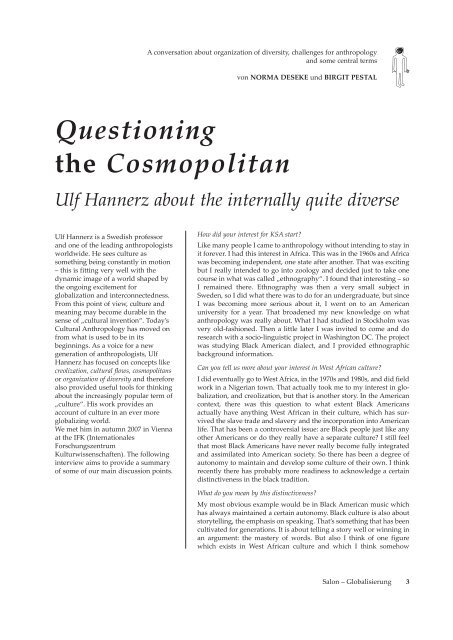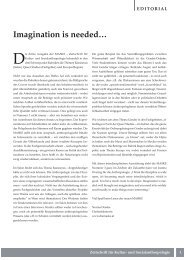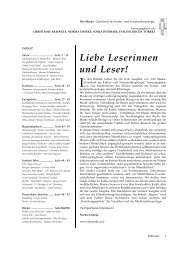Anthropology goes public! - Die Maske
Anthropology goes public! - Die Maske
Anthropology goes public! - Die Maske
Sie wollen auch ein ePaper? Erhöhen Sie die Reichweite Ihrer Titel.
YUMPU macht aus Druck-PDFs automatisch weboptimierte ePaper, die Google liebt.
Questioning<br />
A conversation about organization of diversity, challenges for anthropology<br />
and some central terms<br />
the Cosmopolitan<br />
von NORMA DESEKE und BIRGIT PESTAL<br />
Ulf Hannerz about the internally quite diverse<br />
Ulf Hannerz is a Swedish professor<br />
and one of the leading anthropologists<br />
worldwide. He sees culture as<br />
something being constantly in motion<br />
– this is fitting very well with the<br />
dynamic image of a world shaped by<br />
the ongoing excitement for<br />
globalization and interconnectedness.<br />
From this point of view, culture and<br />
meaning may become durable in the<br />
sense of „cultural invention“. Today’s<br />
Cultural <strong>Anthropology</strong> has moved on<br />
from what is used to be in its<br />
beginnings. As a voice for a new<br />
generation of anthropologists, Ulf<br />
Hannerz has focused on concepts like<br />
creolization, cultural flows, cosmopolitans<br />
or organization of diversity and therefore<br />
also provided useful tools for thinking<br />
about the increasingly popular term of<br />
„culture“. His work provides an<br />
account of culture in an ever more<br />
globalizing world.<br />
We met him in autumn 2007 in Vienna<br />
at the IFK (Internationales<br />
Forschungszentrum<br />
Kulturwissenschaften). The following<br />
interview aims to provide a summary<br />
of some of our main discussion points.<br />
How did your interest for KSA start?<br />
Like many people I came to anthropology without intending to stay in<br />
it forever. I had this interest in Africa. This was in the 1960s and Africa<br />
was becoming independent, one state after another. That was exciting<br />
but I really intended to go into zoology and decided just to take one<br />
course in what was called „ethnography“. I found that interesting – so<br />
I remained there. Ethnography was then a very small subject in<br />
Sweden, so I did what there was to do for an undergraduate, but since<br />
I was becoming more serious about it, I went on to an American<br />
university for a year. That broadened my new knowledge on what<br />
anthropology was really about. What I had studied in Stockholm was<br />
very old-fashioned. Then a little later I was invited to come and do<br />
research with a socio-linguistic project in Washington DC. The project<br />
was studying Black American dialect, and I provided ethnographic<br />
background information.<br />
Can you tell us more about your interest in West African culture?<br />
I did eventually go to West Africa, in the 1970s and 1980s, and did field<br />
work in a Nigerian town. That actually took me to my interest in globalization,<br />
and creolization, but that is another story. In the American<br />
context, there was this question to what extent Black Americans<br />
actually have anything West African in their culture, which has survived<br />
the slave trade and slavery and the incorporation into American<br />
life. That has been a controversial issue: are Black people just like any<br />
other Americans or do they really have a separate culture? I still feel<br />
that most Black Americans have never really become fully integrated<br />
and assimilated into American society. So there has been a degree of<br />
autonomy to maintain and develop some culture of their own. I think<br />
recently there has probably more readiness to acknowledge a certain<br />
distinctiveness in the black tradition.<br />
What do you mean by this distinctiveness?<br />
My most obvious example would be in Black American music which<br />
has always maintained a certain autonomy. Black culture is also about<br />
storytelling, the emphasis on speaking. That’s something that has been<br />
cultivated for generations. It is about telling a story well or winning in<br />
an argument: the mastery of words. But also I think of one figure<br />
which exists in West African culture and which I think somehow<br />
Salon – Globalisierung<br />
3





